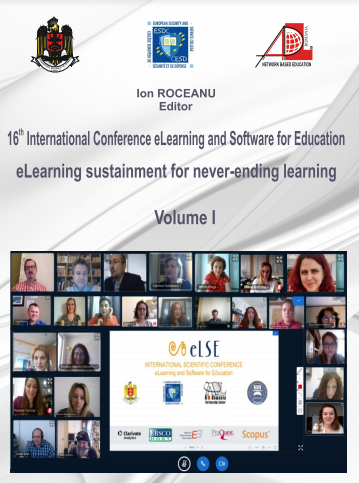PROFORM - BEST PRACTICES IN PROFESSIONAL AND TRANSVERSAL COMPETENCES DEVELOPMENT FOR TEACHING IN INCLUSIVE SCHOOLS
PROFORM - BEST PRACTICES IN PROFESSIONAL AND TRANSVERSAL COMPETENCES DEVELOPMENT FOR TEACHING IN INCLUSIVE SCHOOLS
Author(s): Grigore Albeanu, Maria AndronieSubject(s): ICT Information and Communications Technologies, Inclusive Education / Inclusion, Distance learning / e-learning, Pedagogy
Published by: Carol I National Defence University Publishing House
Keywords: z generation; STEAM; ADDIE; SAMR; spatial and computational intelligence; access technologies;
Summary/Abstract: The main objective of PROFORM is to develop the professional and transversal competences of the teaching staff and the school managers at the level of the counties, to increase their motivation and stability in their position, in order to ensure the quality of the education. This paper describes a selection of the best practices and opened sessions proposed in order to fulfil the main objective of PROFORM. The main tracks of the material are connected to the following topics: information technologies to access, the impact of new IC technologies for teaching, learning and evaluation, STE(A)M educational requirements and performability, open educational resources developed according to the ADDIE-SAMR methodology, and different aspects of computational intelligence (fuzzy reasoning, nature inspired computing, spatial reasoning, connectionism and distributed computing, neutrosophic computing etc.). It is important to mention that educational items refer to z-generation and new challenge is described for XY-generation. There are no results available on z-teachers for z-students. Such new aspects will be considered for the next 10 years when more projects will be developed for Z-teachers. As case study, results are provided for educational programs in Giurgiu County, along six modules selected from the list presented below in complete training stages. The main modules are: (1) Information Processing, Communication (ICT) and e-Learning technologies in education; (2) Methods and techniques for optimizing teaching activities; (3) Innovative methods and techniques for evaluating school results; (4) Cognitive behavioural coaching to optimize professional performance; (5) School-family-community partnership for inclusive schools; (6) Career management through personal and professional development; (7) Student's knowledge and assessment of learning progress; (8) Differentiated training - the theory of multiple intelligences; (9) Evaluation adapted to the individual particularities of the beneficiaries of education; (10) School management for institutional capacity development; (11) Educational projects and programs; (12) Performance and motivation in the school organization.
Journal: Conference proceedings of »eLearning and Software for Education« (eLSE)
- Issue Year: 16/2020
- Issue No: 01
- Page Range: 419-428
- Page Count: 10
- Language: English

